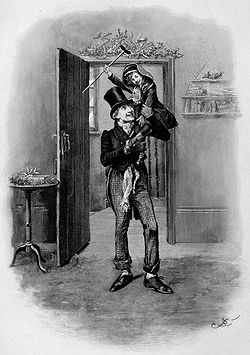This article needs additional citations for verification .(April 2022) |
| Bob Cratchit | |
|---|---|
| A Christmas Carol character | |
 Bob Cratchit and Tiny Tim as depicted in the 1870s by Fred Barnard | |
| First appearance | A Christmas Carol 1843 |
| Created by | Charles Dickens |
| In-universe information | |
| Nickname | Bob |
| Gender | Male |
| Occupation | Money accountant (Clerk) |
| Spouse | Mrs. Cratchit (named Emily in some adaptations) |
| Children | Martha Belinda Peter Tiny Tim an unnamed son (named Matthew in some adaptations) an unnamed daughter (named Lucy or Gillian in some adaptions) |
| Nationality | English |
Robert "Bob" Cratchit is a fictional character in the Charles Dickens 1843 novel A Christmas Carol . The overworked, underpaid clerk of Ebenezer Scrooge, Cratchit has come to symbolize the poor working conditions, especially long working hours and low pay, endured by many working-class people in the early Victorian era.
Contents
Cratchit's son, Tiny Tim, is also a defining character in the novel.